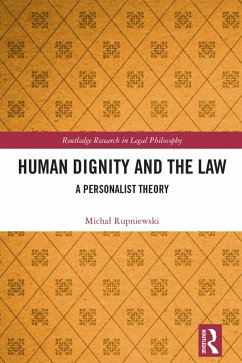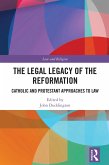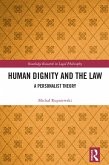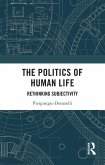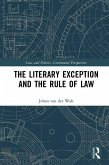41,95 €
41,95 €
inkl. MwSt.
Sofort per Download lieferbar

21 °P sammeln
41,95 €
Als Download kaufen

41,95 €
inkl. MwSt.
Sofort per Download lieferbar

21 °P sammeln
Jetzt verschenken
Alle Infos zum eBook verschenken
41,95 €
inkl. MwSt.
Sofort per Download lieferbar
Alle Infos zum eBook verschenken

21 °P sammeln
- Format: ePub
- Merkliste
- Auf die Merkliste
- Bewerten Bewerten
- Teilen
- Produkt teilen
- Produkterinnerung
- Produkterinnerung

Bitte loggen Sie sich zunächst in Ihr Kundenkonto ein oder registrieren Sie sich bei
bücher.de, um das eBook-Abo tolino select nutzen zu können.
Hier können Sie sich einloggen
Hier können Sie sich einloggen
Sie sind bereits eingeloggt. Klicken Sie auf 2. tolino select Abo, um fortzufahren.

Bitte loggen Sie sich zunächst in Ihr Kundenkonto ein oder registrieren Sie sich bei bücher.de, um das eBook-Abo tolino select nutzen zu können.
This book reassesses the relationship between human dignity, law and specifically the 'personalist' school of agency. It will be of interest to academics and researchers working in the areas of Legal Philosophy, Jurisprudence, Philosophy, Ethics and Political Theory.
- Geräte: eReader
- mit Kopierschutz
- eBook Hilfe
Andere Kunden interessierten sich auch für
![The Legal Legacy of the Reformation (eBook, ePUB) The Legal Legacy of the Reformation (eBook, ePUB)]() The Legal Legacy of the Reformation (eBook, ePUB)43,95 €
The Legal Legacy of the Reformation (eBook, ePUB)43,95 €![EcoLaw (eBook, ePUB) EcoLaw (eBook, ePUB)]() Margaret DaviesEcoLaw (eBook, ePUB)22,95 €
Margaret DaviesEcoLaw (eBook, ePUB)22,95 €![Human Dignity and the Law (eBook, PDF) Human Dignity and the Law (eBook, PDF)]() Michal RupniewskiHuman Dignity and the Law (eBook, PDF)41,95 €
Michal RupniewskiHuman Dignity and the Law (eBook, PDF)41,95 €![Human Dignity and Law (eBook, ePUB) Human Dignity and Law (eBook, ePUB)]() Stephen RileyHuman Dignity and Law (eBook, ePUB)45,95 €
Stephen RileyHuman Dignity and Law (eBook, ePUB)45,95 €![The Politics of Human Life (eBook, ePUB) The Politics of Human Life (eBook, ePUB)]() Piergiorgio DonatelliThe Politics of Human Life (eBook, ePUB)40,95 €
Piergiorgio DonatelliThe Politics of Human Life (eBook, ePUB)40,95 €![The Literary Exception and the Rule of Law (eBook, ePUB) The Literary Exception and the Rule of Law (eBook, ePUB)]() Johan Van Der WaltThe Literary Exception and the Rule of Law (eBook, ePUB)43,95 €
Johan Van Der WaltThe Literary Exception and the Rule of Law (eBook, ePUB)43,95 €![The Anthropological Paradox (eBook, ePUB) The Anthropological Paradox (eBook, ePUB)]() Massimo De CarolisThe Anthropological Paradox (eBook, ePUB)46,95 €
Massimo De CarolisThe Anthropological Paradox (eBook, ePUB)46,95 €-
-
-
This book reassesses the relationship between human dignity, law and specifically the 'personalist' school of agency. It will be of interest to academics and researchers working in the areas of Legal Philosophy, Jurisprudence, Philosophy, Ethics and Political Theory.
Dieser Download kann aus rechtlichen Gründen nur mit Rechnungsadresse in A, B, BG, CY, CZ, D, DK, EW, E, FIN, F, GR, HR, H, IRL, I, LT, L, LR, M, NL, PL, P, R, S, SLO, SK ausgeliefert werden.
Produktdetails
- Produktdetails
- Verlag: Taylor & Francis eBooks
- Seitenzahl: 258
- Erscheinungstermin: 5. August 2022
- Englisch
- ISBN-13: 9781000631043
- Artikelnr.: 64189515
- Verlag: Taylor & Francis eBooks
- Seitenzahl: 258
- Erscheinungstermin: 5. August 2022
- Englisch
- ISBN-13: 9781000631043
- Artikelnr.: 64189515
- Herstellerkennzeichnung Die Herstellerinformationen sind derzeit nicht verfügbar.
Michal Rupniewski is Assistant Professor (adiunkt) at the University of Lodz, Faculty of Law and Administration, Department of Political and Legal Doctrines, Poland. He is Associate at the Alexis de Tocqueville Centre for Political and Legal Thought, Poland. Professor Rupniewski has participated in courses and stipends at the universities of Bonn, Strasbourg, and Fordham. He served as guest lecturer at the Universidad Panamericana in Mexico City. His chief scholarly interest is political philosophy's influence on legal interpretation and legislation. In particular, he specialises in political liberalism, personalism, human dignity and law, as well as in theory of legal change.
Preface
Acknowledgements
Outline
Chapter 1. Methodological credentials of human dignity in the law
Chapter 2. Philosophy: the personalist conception of human action and
respect proper to persons
Chapter 3. Law: the status of personhood and the dignitarian moment
Chapter 4. Politics: institutions and the status of personhood
1 Methodological credentials of human dignity in the law
Introduction
1 Three methodological commitments as a point of departure
1.1 The prima facie function of human dignity
1.2 The problem of consensus and metaphysical parsimony in law
1.3 Law and reality
2 Defining and explicating human dignity in the law
2.1 The questions of definition
2.2 The rules of explication
3 The dignitarian moment in the law
3.1 The foundational function
3.2 The regulative function
3.3 The heuristic function
3.4 The meta-legal level
3.5 Toward interpretation of the dignitarian moment
Conclusion
2 Philosophy: the personalist conception of human action and affirmation
proper to persons
Introduction
1 Mapping personalism: the Personalist Postulate
2 Securing personalism: empirical basis and empirical relevance
3 Ontology: human action as the actus personae
3.1 Self-determination and vertical transcendence
3.2 Self-possession and self-governance as the experiential component of
human freedom
3.3 Reference to truth as the condition of transcendence and fulfilment:
the role of integration
4 Normativity: affirmation of persons
4.1 The personalist value of the actus personae and dignity of the person
4.2 The moral duty: source, content, and structure of moral judgement
Conclusion
3 Law: the status of personhood and the dignitarian moment
Introduction
1 The suppositum humanum in legal inquiries
1.1 The 'praxiological' and the 'ethical' interpretation of human dignity
in the law
1.2 The praxiological reading and the autonomy of human dignity in the law
2 The realism of the SPT: the ontological referral and reflective
equilibrium
3 Human dignity as the status of personhood
3.1 Dignitarian legal interests of the human person
3.2 The Principle of the Status of Personhood as an explication of human
dignity in the law: the status of personhood as a status-expressing
principle
3.3 The Principle of the Status of Personhood, wide reflective equilibrium,
and the issue of explaining the dignitarian moment in the law
Conclusion
4 Politics: institutions and the status of personhood
Introduction
1 The status of personhood, participation, and the idea of decent law
1.1 The Principle of the Status of Personhood and genuine participation
1.2 Decency of law and the public order
2 Normative indeterminacy and the principles of adjudication
2.1 Basic assumptions concerning adjudication
2.2 The personalist meaning to equal dignity
2.3 Hard cases and easy cases: toward a theory of error
3 Decent law, social engineering, and the principles of legislation
3.1 Toward dignitarian unity of a legal system: legal personhood
3.2 Legislative standards for decent law and the threats of 'law as
engineering'
Conclusion
Philosophical conclusions
Jurisprudential conclusions
Political conclusions
Information on the Alexis de Tocqueville Centre of Political and Legal
Thought
Index
Acknowledgements
Outline
Chapter 1. Methodological credentials of human dignity in the law
Chapter 2. Philosophy: the personalist conception of human action and
respect proper to persons
Chapter 3. Law: the status of personhood and the dignitarian moment
Chapter 4. Politics: institutions and the status of personhood
1 Methodological credentials of human dignity in the law
Introduction
1 Three methodological commitments as a point of departure
1.1 The prima facie function of human dignity
1.2 The problem of consensus and metaphysical parsimony in law
1.3 Law and reality
2 Defining and explicating human dignity in the law
2.1 The questions of definition
2.2 The rules of explication
3 The dignitarian moment in the law
3.1 The foundational function
3.2 The regulative function
3.3 The heuristic function
3.4 The meta-legal level
3.5 Toward interpretation of the dignitarian moment
Conclusion
2 Philosophy: the personalist conception of human action and affirmation
proper to persons
Introduction
1 Mapping personalism: the Personalist Postulate
2 Securing personalism: empirical basis and empirical relevance
3 Ontology: human action as the actus personae
3.1 Self-determination and vertical transcendence
3.2 Self-possession and self-governance as the experiential component of
human freedom
3.3 Reference to truth as the condition of transcendence and fulfilment:
the role of integration
4 Normativity: affirmation of persons
4.1 The personalist value of the actus personae and dignity of the person
4.2 The moral duty: source, content, and structure of moral judgement
Conclusion
3 Law: the status of personhood and the dignitarian moment
Introduction
1 The suppositum humanum in legal inquiries
1.1 The 'praxiological' and the 'ethical' interpretation of human dignity
in the law
1.2 The praxiological reading and the autonomy of human dignity in the law
2 The realism of the SPT: the ontological referral and reflective
equilibrium
3 Human dignity as the status of personhood
3.1 Dignitarian legal interests of the human person
3.2 The Principle of the Status of Personhood as an explication of human
dignity in the law: the status of personhood as a status-expressing
principle
3.3 The Principle of the Status of Personhood, wide reflective equilibrium,
and the issue of explaining the dignitarian moment in the law
Conclusion
4 Politics: institutions and the status of personhood
Introduction
1 The status of personhood, participation, and the idea of decent law
1.1 The Principle of the Status of Personhood and genuine participation
1.2 Decency of law and the public order
2 Normative indeterminacy and the principles of adjudication
2.1 Basic assumptions concerning adjudication
2.2 The personalist meaning to equal dignity
2.3 Hard cases and easy cases: toward a theory of error
3 Decent law, social engineering, and the principles of legislation
3.1 Toward dignitarian unity of a legal system: legal personhood
3.2 Legislative standards for decent law and the threats of 'law as
engineering'
Conclusion
Philosophical conclusions
Jurisprudential conclusions
Political conclusions
Information on the Alexis de Tocqueville Centre of Political and Legal
Thought
Index
Preface
Acknowledgements
Outline
Chapter 1. Methodological credentials of human dignity in the law
Chapter 2. Philosophy: the personalist conception of human action and
respect proper to persons
Chapter 3. Law: the status of personhood and the dignitarian moment
Chapter 4. Politics: institutions and the status of personhood
1 Methodological credentials of human dignity in the law
Introduction
1 Three methodological commitments as a point of departure
1.1 The prima facie function of human dignity
1.2 The problem of consensus and metaphysical parsimony in law
1.3 Law and reality
2 Defining and explicating human dignity in the law
2.1 The questions of definition
2.2 The rules of explication
3 The dignitarian moment in the law
3.1 The foundational function
3.2 The regulative function
3.3 The heuristic function
3.4 The meta-legal level
3.5 Toward interpretation of the dignitarian moment
Conclusion
2 Philosophy: the personalist conception of human action and affirmation
proper to persons
Introduction
1 Mapping personalism: the Personalist Postulate
2 Securing personalism: empirical basis and empirical relevance
3 Ontology: human action as the actus personae
3.1 Self-determination and vertical transcendence
3.2 Self-possession and self-governance as the experiential component of
human freedom
3.3 Reference to truth as the condition of transcendence and fulfilment:
the role of integration
4 Normativity: affirmation of persons
4.1 The personalist value of the actus personae and dignity of the person
4.2 The moral duty: source, content, and structure of moral judgement
Conclusion
3 Law: the status of personhood and the dignitarian moment
Introduction
1 The suppositum humanum in legal inquiries
1.1 The 'praxiological' and the 'ethical' interpretation of human dignity
in the law
1.2 The praxiological reading and the autonomy of human dignity in the law
2 The realism of the SPT: the ontological referral and reflective
equilibrium
3 Human dignity as the status of personhood
3.1 Dignitarian legal interests of the human person
3.2 The Principle of the Status of Personhood as an explication of human
dignity in the law: the status of personhood as a status-expressing
principle
3.3 The Principle of the Status of Personhood, wide reflective equilibrium,
and the issue of explaining the dignitarian moment in the law
Conclusion
4 Politics: institutions and the status of personhood
Introduction
1 The status of personhood, participation, and the idea of decent law
1.1 The Principle of the Status of Personhood and genuine participation
1.2 Decency of law and the public order
2 Normative indeterminacy and the principles of adjudication
2.1 Basic assumptions concerning adjudication
2.2 The personalist meaning to equal dignity
2.3 Hard cases and easy cases: toward a theory of error
3 Decent law, social engineering, and the principles of legislation
3.1 Toward dignitarian unity of a legal system: legal personhood
3.2 Legislative standards for decent law and the threats of 'law as
engineering'
Conclusion
Philosophical conclusions
Jurisprudential conclusions
Political conclusions
Information on the Alexis de Tocqueville Centre of Political and Legal
Thought
Index
Acknowledgements
Outline
Chapter 1. Methodological credentials of human dignity in the law
Chapter 2. Philosophy: the personalist conception of human action and
respect proper to persons
Chapter 3. Law: the status of personhood and the dignitarian moment
Chapter 4. Politics: institutions and the status of personhood
1 Methodological credentials of human dignity in the law
Introduction
1 Three methodological commitments as a point of departure
1.1 The prima facie function of human dignity
1.2 The problem of consensus and metaphysical parsimony in law
1.3 Law and reality
2 Defining and explicating human dignity in the law
2.1 The questions of definition
2.2 The rules of explication
3 The dignitarian moment in the law
3.1 The foundational function
3.2 The regulative function
3.3 The heuristic function
3.4 The meta-legal level
3.5 Toward interpretation of the dignitarian moment
Conclusion
2 Philosophy: the personalist conception of human action and affirmation
proper to persons
Introduction
1 Mapping personalism: the Personalist Postulate
2 Securing personalism: empirical basis and empirical relevance
3 Ontology: human action as the actus personae
3.1 Self-determination and vertical transcendence
3.2 Self-possession and self-governance as the experiential component of
human freedom
3.3 Reference to truth as the condition of transcendence and fulfilment:
the role of integration
4 Normativity: affirmation of persons
4.1 The personalist value of the actus personae and dignity of the person
4.2 The moral duty: source, content, and structure of moral judgement
Conclusion
3 Law: the status of personhood and the dignitarian moment
Introduction
1 The suppositum humanum in legal inquiries
1.1 The 'praxiological' and the 'ethical' interpretation of human dignity
in the law
1.2 The praxiological reading and the autonomy of human dignity in the law
2 The realism of the SPT: the ontological referral and reflective
equilibrium
3 Human dignity as the status of personhood
3.1 Dignitarian legal interests of the human person
3.2 The Principle of the Status of Personhood as an explication of human
dignity in the law: the status of personhood as a status-expressing
principle
3.3 The Principle of the Status of Personhood, wide reflective equilibrium,
and the issue of explaining the dignitarian moment in the law
Conclusion
4 Politics: institutions and the status of personhood
Introduction
1 The status of personhood, participation, and the idea of decent law
1.1 The Principle of the Status of Personhood and genuine participation
1.2 Decency of law and the public order
2 Normative indeterminacy and the principles of adjudication
2.1 Basic assumptions concerning adjudication
2.2 The personalist meaning to equal dignity
2.3 Hard cases and easy cases: toward a theory of error
3 Decent law, social engineering, and the principles of legislation
3.1 Toward dignitarian unity of a legal system: legal personhood
3.2 Legislative standards for decent law and the threats of 'law as
engineering'
Conclusion
Philosophical conclusions
Jurisprudential conclusions
Political conclusions
Information on the Alexis de Tocqueville Centre of Political and Legal
Thought
Index
